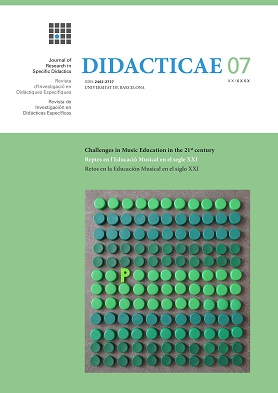Educación musical en el panorama español. Contexto, niveles y perfiles educativos
Music education in Spain. Context, levels and education profiles
DOI:
https://doi.org/10.1344/did.2020.7.17-29Keywords:
didáctica musical, educación musical, formación musical, desarrollo sostenibleAbstract
If we think about the current challenges of Music Education, we could think about employability and training as, currently, music is involved in all areas and contexts that we can imagine, transcending what some pure researchers would call the researcher’s ethical code. If we start considering the challenges for the 21st century as early as in the first quarter of this long-awaited century, there must be something that we did not do well when we set ourselves these challenges at the end of the last century. In this article, some proposals for the different scopes, contexts and educational levels are collected, where music is or should be present, not as an optional subject, but as an educational necessity. We review the current state of Music Education in Early Years, Primary and Secondary Education, music schools and conservatories, universities and other possible non-formal and informal education contexts
References
Gustems, J., y Calderón, D. (2014). Estudio bibliométrico de los artículos de educación musical incluidos en DIALNET 2003-2013. Revista electrónica de LEEME, 33, 27-39.
López de Arenosa, E. (2014). Entrevista. Artseduca, 8,100-103. Recuperado el 10 de abril de 2019 de http://www.e-revistes.uji.es/index.php/artseduca/article/view/1987
Montaner, R. (2019). Educación transfiere las enseñanzas artísticas superiores a Universidades. Levante. El mercantil valenciano. Recuperado el 20 de junio de 2019 de https://www.levante-emv.com/comunitat-valenciana/2019/06/21/educacion-transfiere-ensenanzas-artisticas/1892095.html
Nussbaum, M. (2015). El duro discurso de Martha Nussbaum sobre el futuro de la educación mundial. El Heraldo. Recuperado el 10 de febrero de 2019 https://www.elheraldo.co/educacion/el-duro-discurso-de-martha-nussbaum-sobre-el-futuro-de-la-educacion-mundial-233416
PNUD (s.f.). Objetivos de desarrollo sostenible. Recuperado el 10 de marzo de 2019 http://www.undp.org/content/undp/es/home/sustainable-development-goals.html
Sánchez Caballero, D. (2019). El crecimiento de la universidad privada convierte la educación superior en un negocio de alta rentabilidad. Eldiario.es. Recuperado el 10 de abril de 2019 https://www.eldiario.es/sociedad/negocio-educacion-universitaria-privada_0_887162099.html
UNESCO (s/f). Desglosar el Objetivo de Desarrollo Sostenible 4 Educación 2030. Recuperado el 3 de marzo de 2019 http://unesdoc.unesco.org/images/0024/002463/246300s.pdf
Urquijo, M.J. (2014). La teoría de las capacidades en Amartya Sen. EDETANIA, 46, 63-80, ISSN: 0214-8560. Recuperado el 10 de abril de 2019 https://dialnet.unirioja.es/servlet/articulo?codigo=5010857
Vernia, A.M. (2019) Music education as a base for employement opportunities. Situations and projectes in schools of music and dance, (pp. 179-190). En M. Hann y F-O. Hofecker (Eds.), Cultural institutions studies. Music school research II. The future of music schools – European perspectives. Vienna: Musikschulmanagement.
Vernia, A.M., Gustems, J., y Calderón, C. (2016). La experiencia musical en las personas mayores. Enfoques teóricos y buenas prácticas. Revista Kairós Gerontologia, 19(2), 9-22. ISSNe 2176-901X. São Paulo (SP), Brasil: FACHS/NEPE/PEPGG/PUC-SP. Recuperado el 22 de marzo de 2019 https://revistas.pucsp.br/index.php/kairos/article/viewFile/29976/20780
Vernia, A.M. y Martí, M. (2017). Música y palabra contra el alzheimer. Arte, individuo y sociedad. Arte y Demencia, 29(Núm. Especial), 159-173. Recuperado el 10 de abril de 2019 http://revistas.ucm.es/index.php/ARIS/article/view/53451
Downloads
Published
Issue
Section
License
Copyright (c) 2020 Ana Vernia-Carrasco

This work is licensed under a Creative Commons Attribution-ShareAlike 4.0 International License.
The authors who publish in this journal agree to the following terms:
- Authors retain copyright and grant the journal the right of first publication.
- Submitting a paper does not involve paying any fees.
- Texts will be published under a Creative Commons Attribution Share-Alike 4.0 International License that allows others to share the work, provided they include an acknowledgement of the work’s authorship, its initial publication in this journal and the terms of the license.
- When citing works published in Didacticae, both the autor and the journal must be cited.
- Didacticae does not accept any responsibility for the points of view and statements made by the authors.



